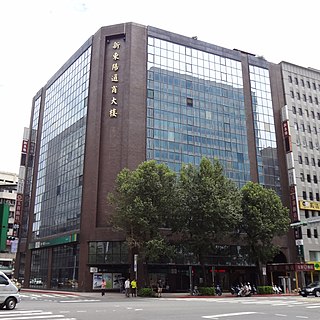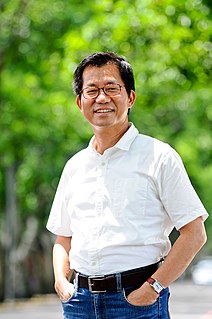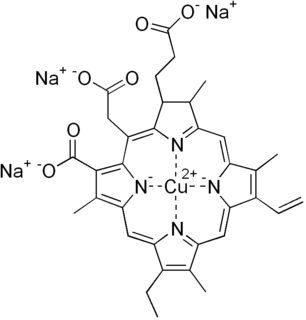
Bubbletea is a Taiwanese tea-based drink invented in Tainan and Taichung in the 1980s. Recipes contain tea of some kind, flavors of milk, as well as sugar (optional). Toppings, such as chewy tapioca balls, popping boba, fruit jelly, grass jelly, agar jelly, and puddings are often added. Ice-blended versions are frozen and put into a blender, resulting in a slushy consistency. There are many varieties of the drink with a wide range of flavors. The two most popular varieties are black pearl milk tea and green pearl milk tea. "Boba" is Cantonese slang for "large breasts" referring to the tapioca balls.
An adulterant is a pejorative term for a substance found within other substances such as food, fuels or chemicals even though it is not allowed for legal or other reasons.

Hsin Tung Yang is a food service company and retailer based in Taipei, Taiwan.
The Wei Chuan Dragons were a professional baseball team in Taiwan's CPBL that existed between 1990 and 1999. In 2019 negotiations are taking place to revive the franchise to rejoin the CPBL, maybe in 2021.

Lee Ying-yuan is a Taiwanese politician. He was elected to the Legislative Yuan in 1995 and stepped down in 2000. In 2005, Lee was appointed the Minister of Council of Labor Affairs, which he led until 2007. Lee has also served as Secretary-General of the Executive Yuan and the Democratic Progressive Party, and was reelected to the Legislative Yuan in 2012. He was appointed the Minister of Environmental Protection Administration in 2016.
Clara Chou is a Taiwanese journalist, television and radio personality.
In 2007 a series of product recalls and import bans were imposed by the product safety institutions of the United States, Canada, the European Union, Australia and New Zealand against products manufactured in and exported from the mainland of the People's Republic of China (PRC) because of numerous alleged consumer safety issues.

The 2008 Chinese milk scandal was a widespread food safety incident in China. The scandal involved milk and infant formula along with other food materials and components being adulterated with melamine. Of an estimated 300,000 victims in China, six babies died from kidney stones and other kidney damage and an estimated 54,000 babies were hospitalized. The chemical gives the appearance of higher protein content when added to milk, leading to protein deficiency in the formula. In a separate incident four years prior, watered-down milk had resulted in 12 infant deaths from malnutrition. The scandal broke on 16 July 2008, after sixteen babies in Gansu Province were diagnosed with kidney stones. The babies were fed infant formula produced by Shijiazhuang-based Sanlu Group. After the initial focus on Sanlu—market leader in the budget segment—government inspections revealed the problem existed to a lesser degree in products from 21 other companies, including an Arla Foods–Mengniu joint venture company known as Arla Mengniu, Yili, and Yashili.
Ting Hsin International Group is a Taiwanese-owned corporate group established in 1958. It owns various food brands such as the instant noodle maker Master Kong, Wei-Chuan Food Corporation and Dicos.
Wei Chuan Foods is a Taiwan-based manufacturer of Chinese condiments, canned goods, drinks, and frozen goods. Its more popular, widely recognized products include canned pickles, soy sauce and oyster sauces, and frozen dumplings and wontons.
Gutter oil is a term used in mainland China, Hong Kong, Macau and Taiwan to describe illicit cooking oil which has been recycled from waste oil collected from sources such as restaurant fryers, grease traps, slaughterhouse waste and sewage from sewer drains.

Chiu Wen-ta is a Taiwanese medical educator. He was the Minister of Health and Welfare of the Executive Yuan from 2011 to 2014.

Lin Tzou-yien is Taiwanese physician. He was the deputy Minister of Health and Welfare and served as acting Minister in October 2014 upon the resignation of Chiu Wen-ta. Upon the appointment of Chiang Been-huang, Lin returned to his previous post until he was promoted again to head the ministry as part of Lin Chuan's incoming cabinet, which took office on 20 May 2016. Lin was succeeded in office by Chen Shih-chung on 7 February 2017.

Woody Duh was the Vice Premier of the Republic of China from 1 February 2016 to 20 May 2016. He was the Governor of Fujian Province. He was the Minister of Economic Affairs (MOEA) of the Republic of China from 10 August 2014 after his predecessor Chang Chia-juch's resignation amid the 2014 Kaohsiung gas explosions. He tendered his resignation from the post on 30 November 2014 after the 2014 Republic of China local election.

Chiang Been-huang is a politician in the Republic of China. He served as the Minister of Health and Welfare from 22 October 2014 to 20 May 2016.
Events from the year 2014 in Taiwan, Republic of China. This year is numbered Minguo 103 according to the official Republic of China calendar.

Pineapple cake is a sweet traditional Taiwanese pastry containing butter, flour, egg, sugar, and pineapple jam or slices.
Events from the year 2015 in Taiwan. This year is numbered Minguo 104 according to the official Republic of China calendar.
Events from the year 2017 in Taiwan. This year is numbered Minguo 106 according to the official Republic of China calendar.














